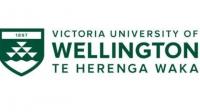Master of Design Technology
Want to tell interesting stories using time-based digital media? The Master of Design Technology (MDT) is designed to build upon the existing digital media skills you’ve acquired in an undergraduate degree.
Learn industry leading software, techniques and professional practices from our experienced lecturers in visual effects (VFX), game design, animation, extended reality (XR), exhibition design and multimedia design.
It’s taught at the Miramar Creative Centre (a partnership with Miramar Creative) among the Weta group buildings on Park Road and offers unrivalled access to work experience and professional connections. We’re proudly supported by Weta Digital with guest lectures and mentoring. We’re, also, a certified SideFX Houdini Certified Partner.
This programme is unique to New Zealand in providing students with the best expertise in both university research and industry practice with which to gain the skills they need for a future in the broad based and rapidly growing technology sector.
You can find further information about the MDT, including detailed course lists, on the Wellington ICT Graduate School website.
Programme structure
MDT is a one-year (full-time) 180-point programme that starts in March each year. Students will produce a professional portfolio based around their chosen focus of study. The practicum that concludes the programme will involve creating a time-based short narrative work produced in teams with the guidance of faculty and industry mentors.
Courses:
MDDN 451 - Creative Coding for Digital Content: This course will teach students computer graphics techniques that are used as current practice in the film industry through a range of projects ranging from generating special effects to the algorithmic treatment of media. Using Houdini and the Vex programming language students will build procedural models and parametric tools, generate environments, grow complex systems and more.
MDDN 421 - Compositing and Motion Graphics (elective): This course will teach students professional approaches to previsualisation, production planning and coordination including workflows for post-production and compositing. Students will progress to asset creation, which may include live action plates, set extensions, visual effects elements, matte painting, and modelling. The primary software for this course will be Nuke from The Foundry
MDDN 432 - Character Animation (elective): This course will teach students how to analyse and create digital animated sequences with a strong focus on using character-based animation to convey compelling and emotive narratives. It’ll focus on technical workflows, skills, and good practices for animating complex characters and will culminate in a final animated short. Students will primarily be using the industry standard 3D platform Maya from Autodesk.
CCDN 412 - M?tauranga Design:This course will teach students how to engage with toi (M?ori creativity) and m?tauranga (M?ori understanding) in the production of both visual and material cultural design that honours our place and past in Aotearoa New Zealand. Guided by traditional M?ori protocols and knowledge, students will learn how to understand and interact with M?ori symbols and visual spatial strategies in ways that are culturally sound and appropriate.
CCDN422 - Design Ideation: This course is an advanced investigation of a range of topics relevant to professional practice in design practice today including branding, marketing, networking, presentation, and portfolio. Students will consider both traditional and emergent approaches to these topics while demonstrating an autonomous design style and content.
MDDN431 - Lighting and Rendering (elective): This course will teach students about traditional applications of lighting such as portraiture, practical studio lighting, and cinematography. You’ll develop a mastery of digital lighting and rendering software in creative focus in areas such as CG animation, games, VR, and motion capture. Working primarily in the 3D software packages Houdini and Unreal, this course will focus on the fundamentals of telling a story through scene construction.
MDDN422 - Effects and Simulation (elective): This course will teach students the skills relating to the creation of creature, human, and mechanical puppet rigs for digital characters, as well as creating digital simulations of physical phenomena. The principle software for this course is Houdini.
MDDN541 – Visual Effects Practicum: This course consists of a supervised practicum, working on design studio-based research and production. Students will work in teams to produce a complete time-based short narrative work with the guidance of faculty and industry mentors.
Campus Information
Miramar Creative Centre
Learn the finer arts of film making, game design, visual effects, exhibition design and multimedia design with teaching direct from the experts.
Intakes
- Feb
- July
- Nov
Application Processing Time in Days: 20
Application Process
Minimum English Language Requirements
| English Level Description | IELTS (1.0 -9.0) | TOEFL IBT (0-120) | TOEFL CBT (0-300) | PTE (10-90) | |
|---|---|---|---|---|---|
| Expert | 9 | 120 | 297-300 | 86-90 | |
| Very Good | 8.5 | 115-119 | 280-293 | 83-86 | |
| Very Good | 8 | 110-114 | 270-280 | 79-83 | |
| Good | 7.5 | 102-109 | 253-267 | 73-79 | |
| Good | 7 | 94-101 | 240-253 | 65-73 | |
| Competent | 6.5 | 79-93 | 213-233 | 58-65 | |
| Competent | 6 | 60-78 | 170-210 | 50-58 | |
| Modest | 5.5 | 46-59 | 133-210 | 43-50 | |
| Modest | 5 | 35-45 | 107-133 | 36-43 | |
| Limited | 4 | 32-34 | 97-103 | 30-36 | |
| Extremely Limited | < 4 | < 31 | < 93 | < 30 |
Job Opportunity Potential
Wellington Careers and Employment
Get connected with employers and the community and prepare for your future employment. Develop your skills and experiences through our programmes and launch your career with confidence.
CV checks
Get your CV checked at a drop-in session.
Talk to someone
Make an appointment for one-to-one guidance with a careers consultant.
Network with employers
Explore your career possibilities and network with potential employers at our expos and other upcoming events.
Employers
Engage with us to build your organisation’s profile on campus and connect with our talented students and graduates.
Graduate recruitment
We host a number of graduate recruitment events throughout the year, where you can meet potential employers and find out about jobs and internships.
PSW Opportunity
- During study, all students on a student visa can work up to 20 hours per week during semester and full time during vacations.
- After completing Level 7 Bachelor’s Degree or Higher Qualification, a student will get a three years open post-study work visa.
- After completing Level 8 Post Graduate courses of 1 year, students get 1 year PSW.
Admission Requirement / Eligibility Criteria
For entry into a programme at postgraduate level (including a graduate diploma, Honour’s degree, postgraduate diploma, or Master’s degree), as a minimum, you need the equivalent of a Bachelor’s (undergraduate) degree from a recognised institution with at least a B average.
A background in a particular subject area may be required or recommended. Entry is at the programme director’s discretion.
IELTS (Academic)
Overall band of 6.5 with no sub-score below 6.0
TOEFL (iBT)
A score of 90 on the internet-based test with at least 20 in writing
Pearson Test of English (Academic)
A score of 58 with a ‘Communicative’ score of not less than 50
C1 Advanced (formerly known as Cambridge English: Advanced (CAE))
A score of 176 or higher, with each skill score no less than 169
C2 Proficiency (formerly known as Cambridge English: Proficiency (CPE))
A score of 176 or higher, with each skill score no less than 169
New Zealand Certificates in English Language (NZCEL)
NZCEL Level 5 (Academic)
Victoria University of Wellington English Proficiency Programme (EPP)
A minimum of two ratings of 5 and two ratings of 4
English New Zealand's Accredited Pathway Assessment
English New Zealand Accredited Pathway Assessment Level 3 (with no skill lower than Level 2)
- Course Type: Full Time
- Course Level: Masters/PG Degree
- Duration: 01 Year 06 Month
-
Total Tuition Fee:
64500 NZD
Annual Cost of Living: 20000 NZD
Application Fee: N/A
Similar Programs
- Master of Urban and Regional Planning at Victoria University of Wellington
- Master of Music Therapy by research at Victoria University of Wellington
- Master of Music Therapy by coursework and research at Victoria University of Wellington
- Master of Indigenous Studies at Victoria University of Wellington
- Master of Communication – MC at Victoria University of Wellington
- Master of Strategic Studie at Victoria University of Wellington

